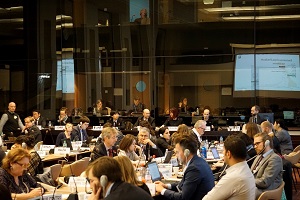
How can Pollutant Release and Transfer Registers (PRTRs) be used for policies related to, for example, health matters, energy consumption, consumer choices or urban planning? What should be done to make this a reality? What role can PRTRs play in helping governments to achieve the Sustainable Development Goals (SDGs)?
These were key questions that guided the discussion at the third Global Round Table on PRTRs held in Geneva on 7-8 November 2018. Since the first round table in 2013, the event receives continuously growing interest as global platform to share ideas and showcase the potential of PRTRs. At this year’s event participants saw remarkable examples from governmental, non-governmental, research and private sector organisations that deal with improving of existing or establishing new PRTR systems. Innovative approaches to the use of PRTRs presented at the meeting were centred around the role of PRTRs for achieving the SDGs and the cross-cutting uses of PRTRs for different stakeholders. Examples given during the event included the use of PRTRs to put into practice the polluters-pays-principle, address several waste management issues, integrate a variety of national and international reporting obligations and improve trust between different stakeholders.
It was highlighted in a number of interventions that PRTRs help governments to fulfil their international reporting obligations in a cost-efficient way; can be combined with other data sources for supporting complex decisions related to economic, social and environmental matters; and that they can enable governments and organizations to make data available in a form that is useful to the public.
The UNECE Protocol on PRTRs has been used as a prototype for establishing PRTRs across the globe and a range of useful guidance material produced under the Organization for Economic Cooperation and Development (OECD) is helping countries to establish PRTR systems effectively and in a harmonized way. As an outcome of the third Global Round Table, looking at the progress made in making use of the potential of PRTRs, it was found that strong political will was the precondition for these achievements. PRTRs have become an important tool for improving access to information on pollutants and their releases thereby promoting transparency in environmental matters around the globe.
Countries were strongly encouraged to use the OECD material for their work on PRTRs in view of improving harmonization across different PRTR systems. Furthermore, as the UNECE Protocol on PRTRs is open for accession by any United Nations Member State, interested countries were encouraged to accede to the Protocol to benefit from its solid framework for implementation.
The discussions underscored the multiple ways that PRTRs can support the implementation of the SDGs, highlighting the fundamental relevance of informed decision-making processes to most, if not all, Goals and targets.
The collection and active dissemination of data on pollution and public rights to information through the use of PRTRs is of cross-cutting relevance in this regard. PRTRs are the best tool known to date for providing access to information on releases of pollutants and wastes. The overarching purpose of PRTRs in this context is that by enhancing transparency and accountability, they can play a central role in promoting peaceful and inclusive societies, and good governance (Goal 16) across the 2030 Agenda.
In addition, PRTRs can also make an important contribution to achieving specific SDGs and targets. For example:
- The establishment of publicly accessible databases on the release of hazardous chemical substances can facilitate early warning and manage and reduce global health risks (target 3.d of Goal 3) and strengthen global resilience to climate-related hazards and natural disasters (target 13.1 of Goal 13);
- PRTRs are also relevant in the context of sustainable corporate practices, as they could make product information available to consumers to inform their choices. While public availability of such information incentivises companies to prevent pollution and helps communicate their efforts in this regard, the collected data allows for fact-based policy evaluation and sound management of chemicals (target 12.4 of Goal 12). In this way, it contributes to the adoption of innovative and sustainable practices (target 12.6 of Goal 12).
Above all, achieving the ambitious SDGs requires working across traditional divisions and presenting information to stakeholders in an integrated manner. PRTRs can offer an effective way to respond to this need. Major principles that guide the establishment of PRTRs regarding data quality, transparency and usefulness to the public can be applied to databases of other sectors, such as health, urban planning and consumer choices, which in their turn can be linked to PRTR data.
The Global Round Table attracted Governments, non-governmental organizations, scientists and other stakeholders from all around the world. The event was organised under the auspices of UNECE and OECD in cooperation with the United Nations Institute for Training and Research and the United Nations Environment Programme. The meeting report, along with the presentations held and other related documents, will be available on the meeting webpage https://www.unece.org/prtr_grt2018.html.

